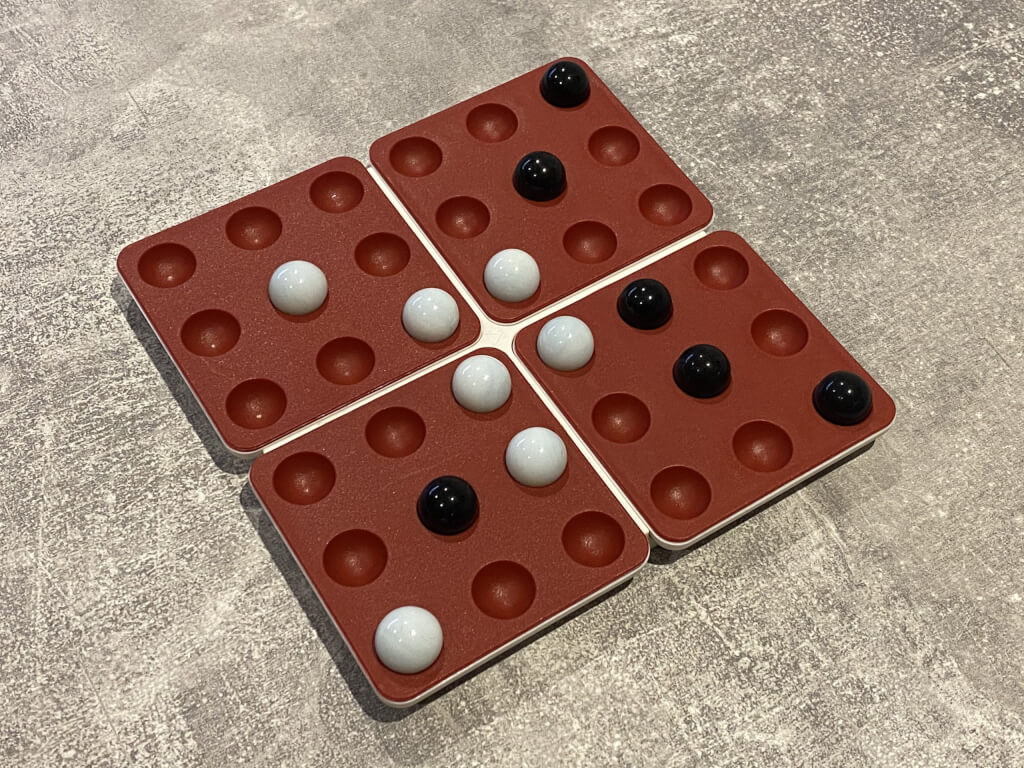When I look at my board game collection, I see dragons, Vikings, knights, colourful farms and countless other subjects, but I can’t see a single themeless game among them. That was, of course, until Pentago arrived. The red, black and white box is as innocuous as they come — and that, for me, has always been a problem.
I don’t know why I tend to favour games built on a theme, but it’s certainly true that I struggle when playing games without one. Where Pentago is concerned, the main attraction is the articulated board, the simplicity of the game, and the fiendish level of head to head competition that it offers.

Pentago is so simple that its instructions are delivered within a single page — and a small one at that. The manual features countless languages across a number of pages, but every flag – from Britain to Greece has just a couple of paragraphs dedicated to it. Combine this with the straightforward components — a board and two sets of marbles in black and white — and that’s the whole thing.
So, what does the single page of instructions say, then? Honestly, if I were to paraphrase, it simply says “put one of your balls onto the board, then rotate any of the four sections — even if it’s a different one to the one you put the ball in.” Wait, what? You can rotate the board? Yes, you can — as I mentioned earlier, it’s articulated.

The plastic board is super, super cool. Each of the four quadrants is attached to a main frame that sits beneath, and by using a sliding motion, can be pulled out and then rotated before being slotted back in. Whilst I was expecting this to be a messy, broken experience let down by rubbish plastics, it’s actually very cool, and it certainly enhances the kerb appeal for enticing players in.
But who actually wants to play this kind of game these days? Well, honestly, I don’t know. In terms of complexity, it lives somewhere between Chess and Draughts, with a slug of Othello or maybe even Connect 4 thrown into the mix. I realise at this point that I haven’t explained what that single page of instructions tells us we must do to win Pentago, and that, friends, is simple; get five of your marbles in a row.

So, picture a single turn in Pentago, where you’ll pick up your marble, put it into the top left quadrant and then perhaps rotate the top right quadrant to sneakily align three of your marbles where previously there was only one. The more marbles, the more complex each turn becomes — twist a quadrant one way or another and you might set up your opponent, and it’s easier said than done.
The upside of Pentago is that it’s the kind of game that as a kid, I’d have played over and over and over again with the same handful of people, each of us achieving a level of mastery that kept each other honest. As an adult, however, it’s hard to dedicate that much time to it, and having played about ten games (each with my wife, because of lockdown) I’d still say that many of our playthroughs ended due to an unforeseen mistake, as opposed to exceptional planning.
So where does that leave Pentago? It’s kind of hard to say honestly. It’s a game that shouldn’t actually sit on the shelf but would be much better off nestled on a corner table, or somewhere else it can be seen so that it piques passing interest. If you can’t play it regularly, Pentago will fall into the category of a kids game and it risks being forgotten.

In our house, it lives on the subwoofer. Yeah, that’s not quite the same level of prominence as the coffee table, but it does mean that people can see it. This works well because not only do we find ourselves playing Pentago at least once every few days (bear in mind a game lasts about ten minutes) but it also means that there are still no themeless games on my board game shelves.
What do I think of it though? Well, Pentago is a cool product, it’s a very interesting idea for a game and it’s a quick and entertaining alternative to the more classic two player strategy games that we all know and love. I think given the price point, if you have the chance to play with one other person frequently, you’ll struggle not to get value for money from Pentago — even if you do normally insist on a more thematic game.
You can purchase Pentago on Amazon.
Love both video games and board games? Here’s our list of some fantastic crossover games.